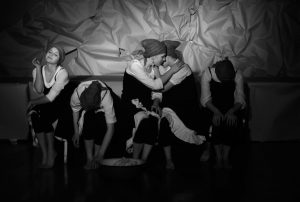Science, art and religion significantly influence human lives. So it is important that their methods and practices were “transparent” – open to reflection, analysis and transformation. Theoretical knowledge and practical “know-how” are inseparable from cultural, social, spatial, temporal and kinesthetic conditioning of their possessors. When we reflect on the conditions of the genesis of this knowledge, we become more mindful of our situation and … creative!
In “Portico” we are mostly interested in philosophy, which reflects on embodied (inseparable from concrete circumstance) experience, and which acknowledges the importance of movement and art practices. Such philosophy is not a mere reflection of some previous truth, but invitation to explore fresh ways of being in the world.
“Genuine philosophy is re-learning to see the world, and in this sense a story recounted can signify the world with as much “depth” as a treatise in philosophy. Our fate is in our own hands. We become responsible for our history by reflection, but also by a decision in which we commit our life. In each case the act is violent and is verified only in actual exercise.“ Maurice Merleau-Ponty
Following some 20 century philosophers we look at philosophy as a concept-creating art. These concepts not only explain the world, inform the subject, but also prepare us for possible transformation.
“The task of philosophy is to create concepts and, especially, to create new concepts. […] Without concepts we can think, but we cannot think conceptually, we cannot understand abstractly, we cannot understand the hypothetical, the possible, the virtual, the counterfactual, the alternative, or what is other than what is. We can think without concepts, but largely perceptually or affectively: we can perceive and feel, and this may perform some of the work of concepts, which perceive and feel the new or what does not yet exist or exist fully as it is. But without concepts we cannot speak of or question the new, what is not, or what might be; without concepts we have only the horizon of a future, a broad direction, but none of its outlines. We need philosophy only to the extent that we need to think in order to change course and move in directions that suit us.“ Elizabeth Grosz
In “Portico” we cherish different ways of conceptualisation, diverse forms of argumentation and discussion. This includes visual concepts – the creation of visual, kinesthetic “pictures” – which are practices stimulating self-expression, which is open to and briskly tunes with the inbreaking future.
